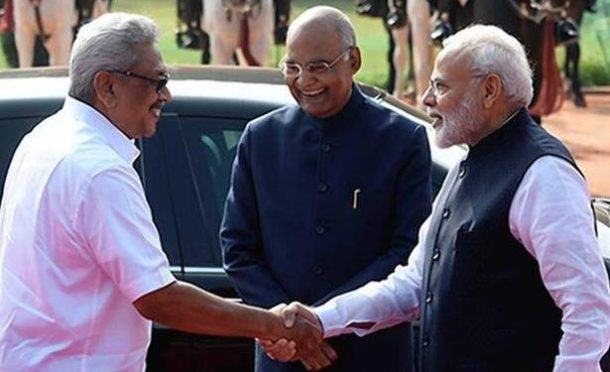With a new High Commissioner and strategy roadmap, Sri Lanka seeks to reset ties with India
By Suhasini Haidar and Meera Srinivasan
NEW DELHI/COLOMBO – After months of strain over a number of issues including the cancelled port project in Colombo, Sri Lanka is preparing to send its High Commissioner-designate to Delhi, along with a ‘roadmap’ to restore ties that includes resolving fishermen’s issues, building connectivity, trade and investment, as well as promoting religious links, Buddhist exchanges and handing over a sacred ‘Sita temple stone’ from Sri Lanka for the proposed Ram temple in Ayodhya.
According to a formal proposal presented to Sri Lankan President Gotabaya Rajapaksa, which The Hindu has seen, the roadmap will help bridge the “growing trust deficit”.
In February, the Modi government expressed its unhappiness over Sri Lanka’s decision to scrap the East Container Terminal project signed in 2019, amidst other signs that China was gaining the upper hand in infrastructure deals in the country. The Rajapaksa government has been disappointed over the lack of movement on requests it made for India for assistance including a debt repayment waiver for three years and a separate currency swap for $1 billion, to help with the economic crisis, which were made by President Gotabaya and Prime Minister Mahinda Rajapaksa to Modi.
“In recent years, the Indo-Sri Lanka bilateral relationship has been increasingly dominated by a transactional approach. This is a consequence of the changes in the geopolitical equilibrium in the region, that have resulted in a growing trust deficit,” says the document prepared by a team led by new High Commissioner- to-be Milinda Moragoda, Deputy High Commissioner Niluka Kadurugamuwa and top diplomats at missions in Delhi, Chennai and Mumbai.
The reset in ties is expected to be marked by the arrival of Moragoda, a former Cabinet Minister, in mid-August. His predecessor High Commissioner Austin Fernando completed his term and returned to Colombo on January 11, 2020, which makes this the longest period the position has remained vacant, even though Moragoda’s appointment was announced in August 2020. While officials say the COVID situation and the lack of connectivity between India and Sri Lanka during the second wave contributed to the delay, no official reason was given to the Indian side who had processed the diplomatic agreement speedily at the time.
An MEA official welcomed news of the High Commissioner’s pending arrival, but said New Delhi had not yet received details of the “Integrated Country Strategy” for India.
In its recommendations, the paper says it is ‘imperative’ that Colombo speeds up the West Container Terminal project that Sri Lanka offered after cancelling the ECT project, as well as the Trincomalee Oil Tank Farm and other pending projects.
It also advocates an inter-Agency Committee on Trade, Investment and Tourism to reach Foreign Direct Investment (FDI) goals of $256 million from India in 2022. While it sets a goal for Sri Lankan exports to India of about $675 million in 2022, it points out that export prospects presently suffer due to “increasing protectionism [in India], limited market access, a challenging and unpredictable regulatory environment as well as the Make in India Initiative, which prioritizes local business and sourcing of local raw materials and products over imports.”
The strategy is silent on the Economic and Technology Cooperation Agreement (ETCA), negotiations for which appear deadlocked.
In his letter to President Gotabaya introducing the paper, Moragoda outlines plans for the next two years of his tenure in Delhi, including high-level visits between both capitals. Putting a special emphasis on the role of Buddhism, which he calls “most precious gift that India has bestowed upon [Sri Lanka]” from the time of Emperor Ashoka, he says the two countries are bound by geography, economics, culture, history and democratic values.
“Against this backdrop, any setbacks to our relationship however intractable they may appear to be at any given point in time, can only be temporary,” Moragoda adds.
The strategy paper advises promoting exchanges of Buddhist and Hindu scholars as well as Sri Lankan Catholic pilgrims to the “Velankanni trail” in Tamil Nadu. In particular, it speaks of handing over a sacred stone from the Sita Amman temple in Sri Lanka for the Ram Temple planned in Ayodhya.
Among the problems, the paper seeks to address is the conflict in the Palk bay, where Sri Lankan fishermen object to Indian fishermen using bottom trawlers and fishing illegally along their coast, which often leads to arrests of the Indians. Indian fishermen accuse the Sri Lankan Navy of attacking and killing them.
The paper suggests that top Sri Lankan diplomats engage directly with the government and fisheries associations in Tamil Nadu. The paper also advises engaging with the MEA, the government in Tamil Nadu and the UNHCR to encourage and facilitate the long-pending return of about 1 lakh Sri Lankan refugees living in India.
Proposals to enhance connectivity include resuming passenger ferry services and more air connectivity and new destinations for Sri Lankan flights. The “air travel bubble”, which only began in April was suspended after a few weeks due to the increase in COVID cases. However, the country strategy paper is silent on taking forward the India-backed Palaly airport and Kankesanthurai Harbour development projects in Jaffna.
-The Hindu


